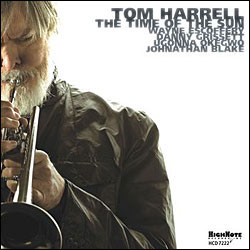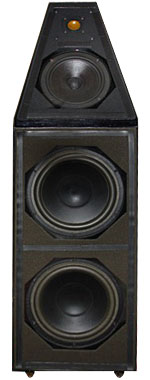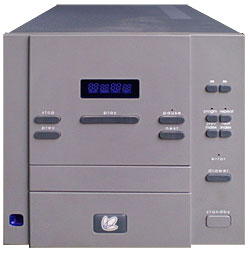New Music: Suun’s “Bambi” & “Red Song”
Suuns - Bambi b/w Red Song by DOJAGSC
The band explains:
Suuns - Bambi b/w Red Song by DOJAGSC
The band explains:
Are you goin' to Scarborough Fair?
Parsley, sage, rosemary and thyme.
Remember me to one who lives there,
She once was a true love of mine.
That memory came back during the e-mail exchanges I had with John Atkinson and Stephen Mejias about the positives and negatives of the proliferation of regional audio shows. (JA's reflections on these shows were the subject of last month's "As We See It.")
 Tom Harrell: The Time of the Sun
Tom Harrell: The Time of the SunTrumpeters use their horns to search for truth. At least that's the folk tale. Somehow, that pure, ringing tone that most strive for at some point in their careerthink Louis Armstrong, Clifford Brown, Miles Davissuggests a quest for deeper knowledge, something closer to the heart. In effect, trumpeters play a knifea blade that can cut through nerve, bone, and sinew to that heart; to realizations, we'd like to think, that force them to be honest.
On the evening of Tuesday, September 27, KEF dealers, friends, and associates celebrated the British loudspeaker company’s 50th anniversary. The event was held in the impressive penthouse residence of British Consul-General, Danny Lopez, where guests were treated to tall glasses of Pimm’s, delicious hors d’oeuvres, and electric views of Midtown Manhattan and Long Island City.
Here’s a pertinent excerpt:
Remembering that I’ll be dead soon is the most important tool I’ve ever encountered to help me make the big choices in life. Because almost everything—all external expectations, all pride, all fear of embarrassment or failure—these things just fall away in the face of death, leaving only what is truly important. Remembering that you are going to die is the best way I know to avoid the trap of thinking you have something to lose. You are already naked. There is no reason not to follow your heart.
And here’s an image of Jobs at home in 1982.

“This was a very typical time. I was single. All you needed was a cup of tea, a light, and your stereo, you know, and that’s what I had.”—Steve Jobs
I'm reminded to live simply, full of love.
Editor's Note: This article was nearly complete when I read of Steve Jobs's death last night. I think the conclusions herein are telling of his passion for making "insanely great" products ... right down to the last detail.
A couple of weeks ago, Steve Guttenberg wrote an article on his Audiophiliac blog entitled, "The Worst-Sounding Audio Product." In it he "aimed [his] sights on the worst sounding product regularly used by millions of people:" the stock Apple iPod ear-bud headphones. There may be some truth in that, but he also said, "Apple is an amazingly innovative company, but it's incapable of selling a decent set of headphones under its own name."
With this, I'm going to have to disagree ...
I can't help it: I like it.
 "No pain; no gain." Thus goes the June 1991 offering from the Cliché-of-the-Month Club(800) MOT-JUSTa saying that seems particularly appropriate for audiophiles with aspirations. High-performance loudspeakers fall into two categories. First are those exasperating thoroughbreds requiring endless Tender Loving Care and fussy attention to system detail to work at all. Take the Avalon Eclipse or the Infinity IRS Beta, for example: when everything is just fine, you put on record after record, trying to get through as much music as possible before the system goes off song again. On the other hand, speakers like the Vandersteens, Magnepans, B&W 801 Matrix, and KEF R107/2 appear to sound excellent even as you unpack them, before you've even put them in what you think might be the optimum positions in your listening room.
"No pain; no gain." Thus goes the June 1991 offering from the Cliché-of-the-Month Club(800) MOT-JUSTa saying that seems particularly appropriate for audiophiles with aspirations. High-performance loudspeakers fall into two categories. First are those exasperating thoroughbreds requiring endless Tender Loving Care and fussy attention to system detail to work at all. Take the Avalon Eclipse or the Infinity IRS Beta, for example: when everything is just fine, you put on record after record, trying to get through as much music as possible before the system goes off song again. On the other hand, speakers like the Vandersteens, Magnepans, B&W 801 Matrix, and KEF R107/2 appear to sound excellent even as you unpack them, before you've even put them in what you think might be the optimum positions in your listening room.
The question is: Are such unfussy designs really high-end? I mean, if they were truly high-performance speakers, shouldn't the owner have to suffer even just a little to reach musical nirvana? "A little pain; some sonic gain!" goes that other familiar saying.
You all know where you stand on this vitally important question. Me, I prefer to sit and construct the following graphical analogy. Draw a vertical axis and mark it "Absolute Performance." (The units are "gb," footnote 1) Now draw a horizontal axis and label it "Setup." (The units are "dU" for "deci-Ungers," footnote 2) Okay, sketch out an inverted V-shape. This curve, something like an engine's torque vs RPM curve, represents the manner in which a system's or component's performance changes according to how it is set up.
 The Proceed CD player is the first digital product from Madrigal Audio Laboratories, a company known for their Mark Levinson preamplifiers and power amplifiers, including the very highly regarded No.20.5 power amplifiers. Given Madrigal's track record of producing ultrahigh-end (and expensive) components, I was surprised and encouraged that the Proceed CD player is so affordably priced.
The Proceed CD player is the first digital product from Madrigal Audio Laboratories, a company known for their Mark Levinson preamplifiers and power amplifiers, including the very highly regarded No.20.5 power amplifiers. Given Madrigal's track record of producing ultrahigh-end (and expensive) components, I was surprised and encouraged that the Proceed CD player is so affordably priced.
The Proceed was a long time in development, reflecting Madrigal's care and thoroughness before releasing a new product. Many technical innovations have been incorporated into the Proceed, and the machine's unusual appearance exemplifies the "start from scratch" attitude behind its development. With its nearly square proportions, grey cabinet, and sparse front-panel controls, the Proceed may set a new trend in audio component styling.
Some modified Grado cans have shown up in the lab. I don't know what my problem was getting to them in a timely manner, maybe it's my dislike in general for Grado cans, maybe it was the trouble I was having getting my corporate shipping set up, but I've finally managed to get around to listening and writing this post.
Oh, well, here we go ...